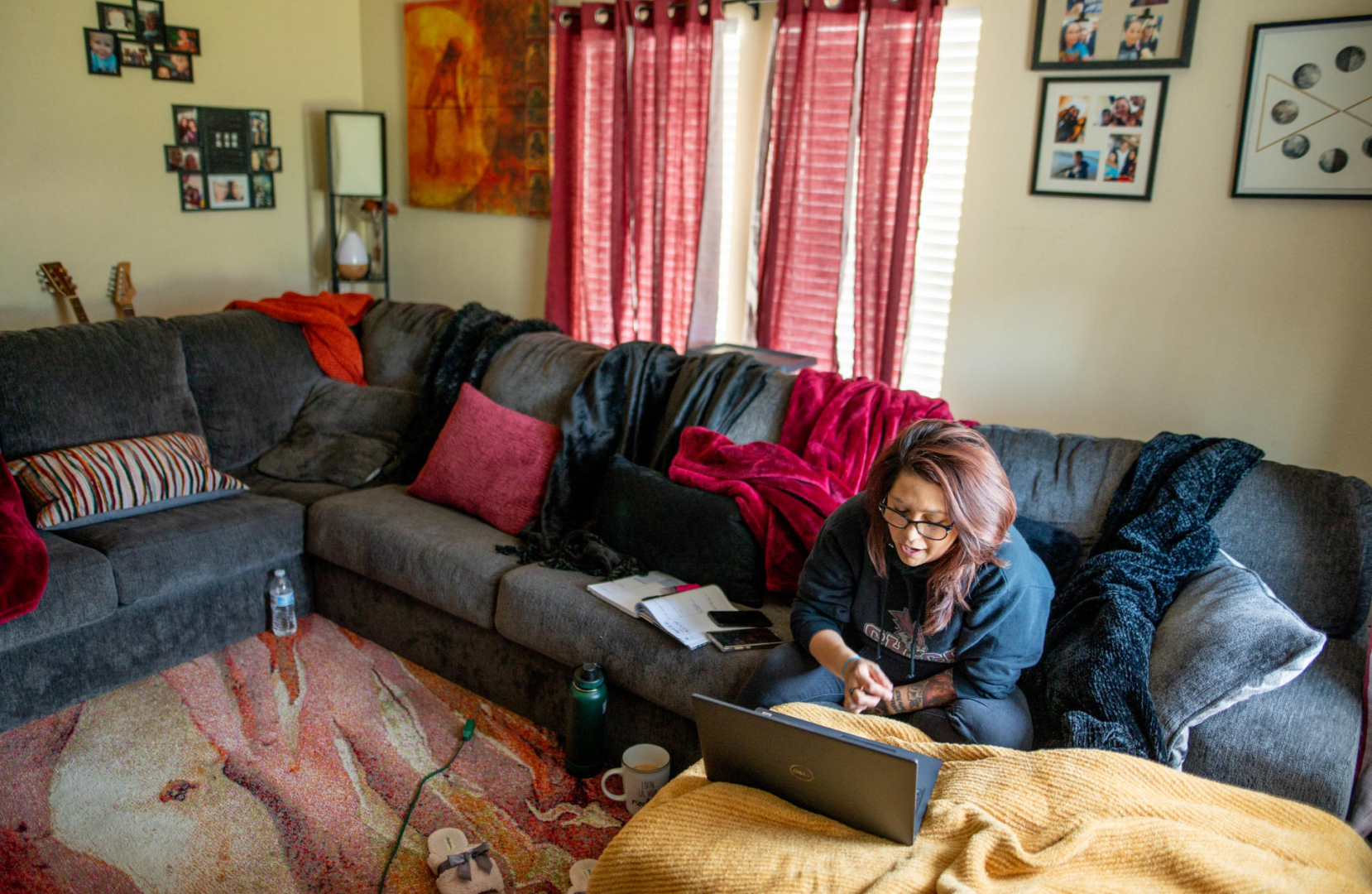Sociology Major Committed to Breaking Negative Family Cycles

Sociology major and returning student Irene Echavarria is photographed in her home while on a zoom call on Monday, April 12, 2021 in Chico, Calif. (Jessica Bartlett/University Photographer)
Every year, students drop out of the education system due to life circumstances, parenting challenges, substance abuse, and other obstacles. It takes a special kind of grit for them to return and finish their degree. This is one of four profiles of reentry students who refuse to give up.
Growing up in a household where abuse and addiction were the norm, Irene Echavarria could have easily discarded any dreams of education—or not lived long enough to achieve them.
Instead, she overcame her own substance abuse, discovered a talent in setting others on a clean path, and is now pursuing her sociology degree. With the help of a scholarship from the Crankstart Foundation, Echavarria, a single mother of three, knows she has the chance to change her family’s trajectory forever.
“So many people work hard, and it’s not a question of hard work, I get that,” said Echavarria. “But I’m on the path, and I’m going to stay on this path, and I will be the one who breaks the cycle of violence and addiction in my family.”
As a young girl, Echavarria disappeared into worlds she discovered in whatever books she could find, reading for hours to escape—if only temporarily—from her tumultuous and toxic home.
“I was never told that I could go to school and be anything I wanted to be, I was never told that I was important or that I mattered, or that if I wanted to have a good life, I would need to go to school and get an education,” she recalled.
So in the seventh grade, with little to look forward beyond high school, Echavarria turned to drugs as a new means of escape.
“Meth, heroin, alcohol, pills, ecstasy, cocaine—just fill in the blank,” she said. “I was the type of addict where oblivion was what I sought.”

With addiction guiding her life throughout high school and as a young adult, Echavarria made bad choice after bad choice. After many attempts to remain clean, multiple arrests, and nearly losing custody of her children forever, Echavarria had enough. With a backpack and duffel bag in tow, at age 38 she left her home in July 2017 and hopped on a train to Southern California for five months of inpatient addiction and mental health treatment.
“I had tried to get clean so many times,” she said. “I knew that if I didn’t leave Northern California, I was going to die.”
After returning to Woodland for outpatient treatment, Echavarria fought tirelessly for custody of her then-9-year-old son, who had been moved to foster care. And she began to dream of a career in sociology, where she could be an advocate for change in others.
After earning her associate’s degree in May 2020, she enrolled at Chico State as a reentry student and is pursuing her studies part time. This allows Echavarria to work full time at a community health clinic. As a peer support advocate, she visits detention facilities, speaks with jail staff, and introduces services for those who are in dire need of health support.
“It’s one of the only jobs where your lived experience is an asset,” Echavarria said. “Having grown up the way I did and being on drugs and being in and out of jail and rehab, that’s an asset.”
Once labeled a lost cause by the child welfare court in Yolo County, Echavarria has regained her footing. When she earns her diploma in 2024, she hopes to set a new tradition for her children—now ages 21, 18, and 11. Together, they study and discuss school, support social justice causes, and look forward to a better future.
“I’ve been able to break a lot of generational stuff. I’m going to get my education, I’m going to go on to grad school, and that will put us in a place where I can purchase a house that I can pass down to my kids,” she said. “I’m going to work hard to rise above it.”


